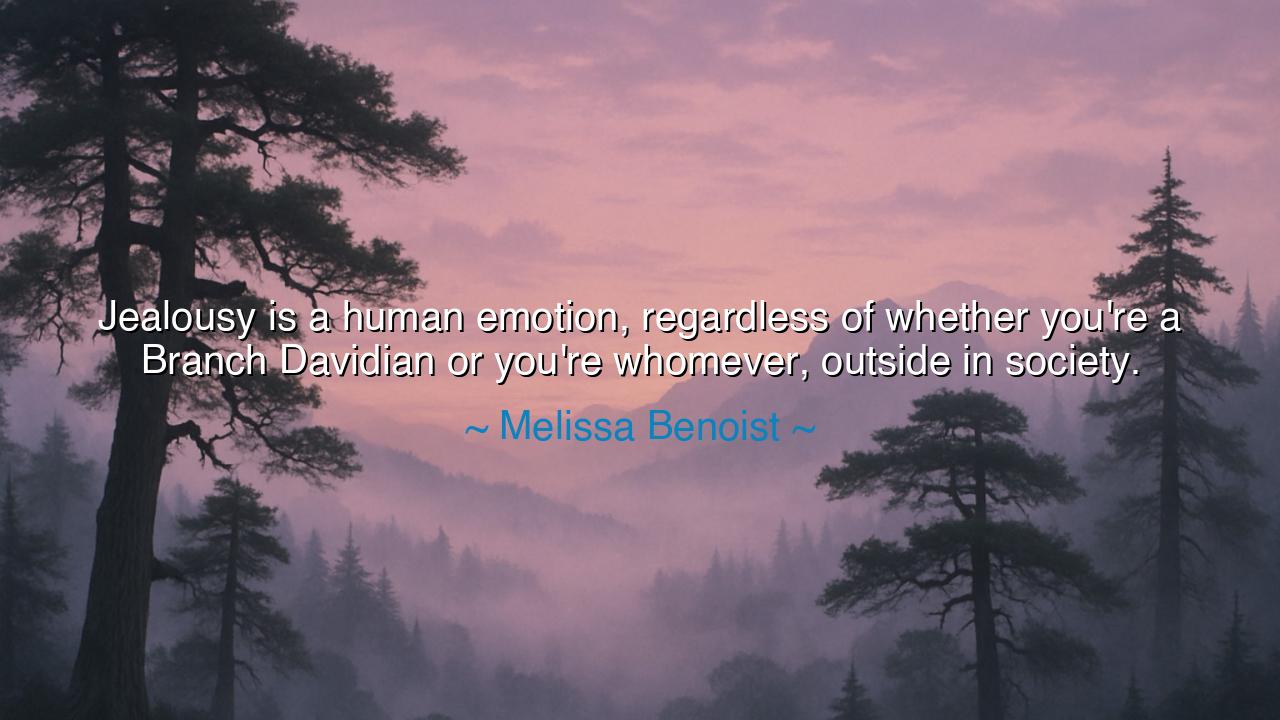
Jealousy is a human emotion, regardless of whether you're a
Jealousy is a human emotion, regardless of whether you're a Branch Davidian or you're whomever, outside in society.






"Jealousy is a human emotion, regardless of whether you're a Branch Davidian or you're whomever, outside in society." These words, spoken by Melissa Benoist, shine a light upon one of the most ancient and perilous emotions that dwell in the human heart—jealousy. With the clarity of one who understands both art and humanity, Benoist reminds us that envy is not confined by culture, creed, or class. It is not the mark of any particular group, but the shared inheritance of all mankind. Whether saint or sinner, ruler or servant, prophet or unbeliever—all who live beneath the sun must face this same shadow within themselves.
To understand her words, we must first know their context. Melissa Benoist, an actress celebrated for her portrayal of complex and deeply human characters, spoke of jealousy in reference to her work portraying lives shaped by devotion, isolation, and belief. The mention of the Branch Davidians, a religious sect that met a tragic end in Waco, Texas, in 1993, is not a condemnation but a mirror. She is saying: even among those who seem set apart—those in spiritual communities, those who reject the world—the same human emotions still burn within. Whether in a quiet household or a fervent congregation, the heart does not change its nature. The flame of jealousy flickers in every soul capable of love, for where there is attachment, there is the fear of losing what one holds dear.
The ancients understood this truth long before our modern age. In the first stories ever told, jealousy is already present, whispering destruction into the hearts of men. Cain and Abel, the sons of Adam, stand as the first testament to its power—how envy turned brother against brother, staining the earth with blood. And yet, from that ancient crime to the smallest rivalries of today, the same thread runs through the tapestry of human behavior: jealousy is the twin of desire, born of the longing to be seen, to be loved, to be chosen. It is, as Benoist implies, universal—a teacher and a tormentor alike.
What makes Benoist’s insight powerful is not only her acknowledgment of jealousy’s reach, but her understanding of its humanity. Too often we treat jealousy as a corruption, as if those who feel it are somehow lesser. But she invites us to see it instead as a mirror—an emotion that reveals rather than condemns. Jealousy, like hunger or fear, is part of the human design. It tells us what we value, what we fear to lose, and where our hearts are most vulnerable. Even in the most devout or the most detached, this feeling arises, proving that emotion does not bow to ideology. The Branch Davidian in his compound and the businessman in his tower both feel the same pang when threatened by comparison or loss. Such is the equality of the human spirit.
Yet, while jealousy is natural, it is not harmless. Left unchecked, it becomes a fire that consumes not only the one who feels it, but all who stand near. History is rich with its ruinous lessons. Julius Caesar, betrayed by those closest to him, fell not to his enemies but to the envy of supposed allies. Othello, noble and strong, was undone by the poisonous seed of jealousy sown in his heart. Even in the realm of faith, countless schisms, wars, and betrayals have sprung from envy disguised as righteousness. The lesson Benoist points toward is timeless: to be human is to feel jealousy—but to be wise is to master it.
The ancients would have said that emotion is neither good nor evil—it is how one governs it that determines the soul’s measure. Aristotle taught that virtue lies in balance: not in the denial of feeling, but in its right use. So too must jealousy be transformed—from envy into admiration, from bitterness into motivation. To feel jealous is to be reminded of your own desires. Let it not drive you to destruction, but to creation. Turn it into fuel for self-growth rather than comparison. For when we learn from our jealousy, we cease to be its prisoner and become its student.
Let this be the teaching passed down from Benoist’s insight: do not deny your jealousy, but do not dwell in it. Recognize it as part of your humanity, as a whisper from the soul telling you where you still long to grow. Whether you live among the faithful or the faithless, whether you walk in glory or in obscurity, remember that we are all joined by the same pulse of emotion. The difference between the wise and the lost lies not in what they feel, but in how they respond. So when jealousy comes—when its shadow falls upon your heart—meet it not with shame, but with awareness. For to understand your jealousy is to understand your humanity, and to rise above it is to understand your freedom.






AAdministratorAdministrator
Welcome, honored guests. Please leave a comment, we will respond soon